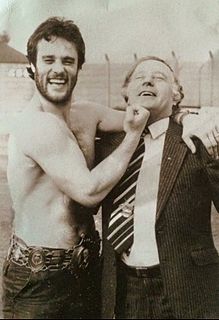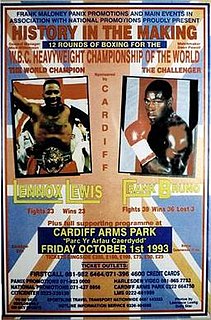Albert Finch was a British boxer from Croydon in South London, who was active from 1945 to 1958. He fought as both a middleweight and light-heavyweight, becoming British middleweight champion in 1950.
Joseph Erskine was a heavyweight boxer from the Butetown district of Cardiff, Wales. He was an Amateur Boxing Association Champion, Inter-Services Champion, and British Army Champion in 1953. He began fighting as a professional in 1954 and was trained by Freddie Elvin. He held the British heavyweight title from August 1956 to June 1958. In all, he won 45 of his 54 professional bouts, losing 8, with one drawn. His best wins were against George Chuvalo, Henry Cooper, Dick Richardson, Uli Ritter, Jack Bodell, Johnny Williams, Joe Bygraves and Willie Pastrano.
Nicky Piper MBE is a retired Welsh super middleweight and light heavyweight boxer from Culverhouse Cross, Cardiff. His career was at its peak in the 1990s; he became the Commonwealth Light-heavyweight champion in 1995. He was trained by Charlie Pearson and managed by Frank Warren. Since retiring from boxing, Piper has become a notable administrator in British boxing and currently works for The City Hospice as their Corporate Partnerships Manager.

David "Bomber" Pearce was a British heavyweight boxing champion.
John Charles Peterson OBE TD was a Welsh boxer who held the British heavyweight boxing title on two occasions.
Richard Alexander Richardson was a heavyweight boxer from the Maesglas area of Newport, Monmouthshire, Wales. He held the European heavyweight title from March 1960 to June 1962. In all, he won 31 of his 47 professional bouts, losing 14, with two drawn. He was one of a quartet of British heavyweights in the 1950s and early 1960s, along with Henry Cooper, Joe Erskine and Brian London, who held out the possibility of a challenging for a heavyweight world champion.

John Michael Basham was a Welsh boxer who became British and European champion at both welter and middleweight. His professional career spanned over 20 years, from 1909 to 1929, and after being stationed in Wrexham through military service, he fought most of his bouts in nearby Liverpool.

Lennox Lewis vs. Frank Bruno, billed as "The Battle of Britain" was a professional boxing match contested on 1 October 1993 at Cardiff Arms Park in Wales. It was between WBC heavyweight champion Lennox Lewis, who was making the second defence of his title and Frank Bruno, who was fighting in his third world title bout, his two previous title fights having been unsuccessful. Lewis beat Bruno by a technical knockout in the seventh round.
Boxing is a popular sport in Wales, and since the early 20th century Wales has produced a notable number of professional boxers including several World Champions. The most notable boxers include Wales' first World Champion Percy Jones; Jimmy Wilde, who is seen as pound-for-pound one of the World's finest boxers and Joe Calzaghe, who ended his career an undefeated World Champion.
Pat Thomas was a Light-middleweight boxer, originally from Saint Kitts and Nevis, who took British citizenship and won two British boxing titles in the 1970s and 80s. After leaving Saint Kitts, Thomas settled in Cardiff in Wales, and is recognised as a Welsh fighter taking the Welsh light middleweight Championship in 1977.
Richard John Power was a Welsh professional heavyweight boxer. Born in Crumlin in Monmouthshire, Power became the Welsh heavyweight champion in 1926.
Trevor Llewellyn was a Welsh professional heavyweight boxer. Born in Newport in Monmouthshire, Llewellyn became the Welsh heavyweight champion in 1922. A police officer by profession, he often fought under the name PC Trevor Llewellyn.
Neil Haddock is a Welsh former lightweight and super featherweight boxer. Before turning professional he won a silver medal as a lightweight at the 1986 Commonwealth Games. His early career as a professional lightweight was not very notable, but after a year out from boxing caused by an eye injury, he returned fitter and lighter as a super featherweight. In 1992 he became the Welsh super featherweight champion, taking the British title just five months later. He retired from boxing in 1994.

Neville Meade was a British boxer from Swansea. Born in Montserrat, he moved to Wales at the age of nine. He rose to prominence when he won the gold medal in the heavyweight division at the 1974 Commonwealth Games in New Zealand. He turned professional in 1974 and won the Welsh Heavyweight title in 1976 and then followed this with the British title in 1981. He retired in 1983 after a failed defence of his British title.
Redvers Sangoe was a Welsh light heavyweight boxer. Based in Tiger Bay in Cardiff, Sangoe's professional career spanned from 1956 to 1960 and he held the Welsh light heavyweight title from 1958 to 1960, successfully defending it on two occasions. In 1964 Sangoe was involved in a street brawl and died from a stab wound sustained in the encounter.
Steve Curtis was a professional bantamweight boxer from Wales. Born in Cardiff, Curtis was notable for becoming the Welsh bantamweight champion in 1969.
Dennis Avoth is a retired Egypt-born heavyweight boxer. Avoth was a promising amateur boxer who turned professional in 1967. He held the Welsh Heavyweight Championship title from 1971 to 1973. He is the brother of Eddie Avoth, who was also a boxer and who became British, and Commonwealth Light-heavyweight champion, and European Light-heavyweight challenger.
Philip Cilia was a Welsh Middleweight boxer who fought under the name Phil Edwards. Edwards was Wales middleweight champion from 1957 until his retirement in 1962. One of the best British fighters at his weight, Edwards was unfortunate to box during the reign of Terry Downes, and he twice failed in a challenge for the British title against Downes.

Joe Cordina is a Welsh professional boxer who has held the IBF super-featherweight title since June 2022. At regional level, he held the British and Commonwealth lightweight titles between 2018 and 2019. As an amateur, he won a bronze medal at the 2014 Commonwealth Games and gold at the 2015 European Championships, both in the lightweight division. He also represented Great Britain at the 2016 Summer Olympics.
Joshua Buatsi is a British professional boxer who held the British light-heavyweight title in 2019. As an amateur, he won a bronze medal in the light-heavyweight division at the 2016 Olympics in Rio de Janeiro, Brazil.





